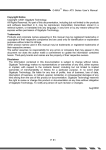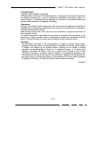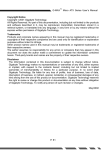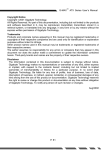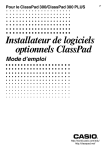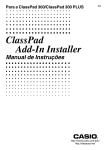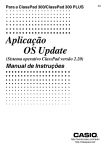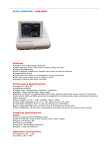Download G-MAX Micro ATX Series User's Manual P. E1 Copyright Notice
Transcript
G-MAX Micro ATX Series User’s Manual Copyright Notice Copyright 2001 Gigabyte Technology. All Rights Reserved. No part of this documentation, including but not limited to the products and software described in it, may be reproduced, transmitted, transcribed, stored in a retrieval system, or translated into any language, in any form or by any means without the express written permission of Gigabyte Technology. Trademarks Products and corporate names appearing in this manual may be registered trademarks or copyrights of their respective companies and are used only for identification or explanation purposes without intent to infringe. Other product names used in this manual may be trademarks or registered trademarks of their respective owners. The author assumes no responsibility for any errors or omissions that may appear in this document nor does the author make a commitment to update the information contained herein. Third-party brands and names are the property of their respective owners. Disclaimer The information contained in this documentation is subject to change without notice. Gigabyte Technology makes no representations or warranties of any kind, either express or implied, with respect to the contents hereof, including but not limited to implied warranties of merchantability or fitness for a particular purpose. In no event shall Gigabyte Technology. Be liable for any loss of profits, loss of business, loss of data, interruption of business, or indirect, special, incidental, or consequential damages of any kind arising from the use of this product or documentation. Gigabyte Technology reserves the right to revise or change this product or documentation at any time without obligation of Gigabyte Technology. To notify any person of such revision or changes. Dec/2001 P. E1 G-MAX Micro ATX Series User’s Manual Preface This system unit is designed to be stable, safe, and easy to use. The system can be upgraded and expanded in function easily if correct procedure is followed. For your own safety and to avoid accidental damage to your system, please ensure you follow the following precautions: Follow all the warnings and instructions marked on the products. To remove or clean the product, remember to unplug the power cord. Place your system unit in a cool, clean space, to be far away from water, heat and dust. Before connecting any peripheral equipment, please unplug the power cord from the system unit to prevent unexpected damage. The AC input supplies power to the system unit. Check your dealer if you can not recognize the type of the power supply. CAUTION Danger of explosion if battery is incorrectly replaced. Replace only with the same or equivalent type recommended by the manufacture. Dispose of used batteries according to the manufacturer’s instructions. Introduction G-MAX series product, to adopt main board of design & development by GIGABYTE that is Micro ATX mechanical design in advance, let you work smoothly in Windows environment. Micro ATX adopt dexterous mechanical design, so it is ease by assembly & safeguard. Specification Overview Micro ATX chassis Micro ATX main board of GIGABYTE Power supply DVD-ROM / CD-ROM 1.44 “FDD Multi I/O Card (Option) Assembly Box Content Main board user’s manual User’s manual Main board Driver CD IDE cable Cable Tie Screw bag Mouse P. E2 G-MAX Micro ATX Series User’s Manual Items included in the package Software and manuals Cables Power Cord Mouse PC P. E3 G-MAX Micro ATX Series User’s Manual I. Chassis ■Dimension 405(D)mm x 180(W)mm x 352(H)mm This chassis is made with material complied with UL specification and designed for space saving and easy open with thumbscrew. There are two 5.25” and three 3.5” drive bays. This chassis complies with corresponding EMC and safety regulations. II. Motherboard See Motherboard Manual for details. III. Power Supply The ATX switching power supply included with this product supports soft off function. Hence, the system can be shut down automatically under Microsoft Windows 98 (or higher versions) commands. Default input voltage setting is 230V. Note: Please check the voltage requirements in the country you reside before turning on the PC. IV. System Component Installation ■Remove the screws of the side cover of the chassis, push backward to dismount the cover. Remove front panel For different processor types, please refer to below installation guide. ■CPU (For Intel Pentium Ⅲand Intel Celeron processors) CPU Pin Lever P. E4 G-MAX Micro ATX Series User’s Manual 1. Insert the CPU on the CPU socket. Before installation, lift up the lever and align the cut of the CPU with the marking on the socket. 2. Pull down the lever to lock the CPU on the socket after installation. When you are installing the heat sink, please make sure to keep the heat sink tight against the CPU to obtain the best cooling result. 3. Apply the thermal compound to one side of the template, and ensure the compound is spread evenly across the template and repeat if necessary. 4. Connect fan power connector to the CPU FAN connector on the motherboard. Click heat sink lock on the CPU socket Install fan on top of CPU ■CPU(For Intel Pentium 4 processors) CPU Pin Lever 1.Insert the CPU on the CPU socket. Before installation, lift up the lever and align the cut of the CPU with the marking on the socket. 2.Pull down the lever to lock the CPU on the socket after installation. Put CPU cooler on retention module and make sure to keep the heat sink tight against the CPU to obtain the best cooling result. Lock the cooler on retention module. 3. Apply the thermal compound to one side of the template, and ensure the compound is spread evenly across the template and repeat if necessary. 4. Connect fan power connector to the CPU FAN connector on the motherboard. Click the heat sink locker to the motherboard retention module. Install fan on top of CPU P. E5 G-MAX Micro ATX Series User’s Manual ■CPU (For Intel Tualatin processors) In this section you will find the gist of CPU installation. CPU Pin Lever 1.Insert the CPU on the CPU socket. Before installation, lift up the lever and align the cut of the CPU with the marking on the socket. 2.Pull down the lever to lock the CPU on the socket after installation. Put CPU cooler on retention module and make sure to keep the heat sink tight against the CPU to obtain the best cooling result. Lock the cooler on retention module. 3. Apply the thermal compound to one side of the template, and ensure the compound is spread evenly across the template and repeat if necessary. 4. Connect fan power connector to the CPU FAN connector on the motherboard. Click fan lock on the pin at sides of CPU socket. Install fan on top of CPU Set CPU clock frequency from BIOS Setup, see Motherboard Manual for details. TM For AMD Athlon and AMD DuronTM processors, the installation method will be similar to Intel Pentium Ⅲand Intel Celeron processors P. E6 G-MAX Micro ATX Series User’s Manual ■Memory Notches at sides of module SDRAM Position notches. Make sure that the notches should align the pin on DIMM slot on the motherboard Notches at sides of module DDR Position notches. Make sure that the notches should align the pin on DIMM slot on the motherboard In this section we will guide you to install 168-pin DIMM RAM module. First, make sure the position notches at the bottom of the module should align to the pins on the module sockets on the motherboard, then push the module downward until the locks hook up notches at sides. Locks: make sure they hook up the notches at sides of module P. E7 G-MAX Micro ATX Series User’s Manual ■Hard Drive Installation 1.Remove 3 screws in front of the hard drive chassis and dismount chassis. 2.The chassis accommodates up to three 3.5” storage devices. Select a place and fix the hard drive with screws. 3.5”Floppy Drive Hard drives 3.Connect the IDE cable included in the accessory box to the connector on the hard drive. Make sure that the RED wire on the ribbon connects to PIN 1 of the hard drive. Connect to hard drive 4.Connect power connector to the hard drive. P. E8 G-MAX Micro ATX Series User’s Manual 5.Install chassis back to position after completing hard drive installation. 6.Connect the other end of the IDE connector to the IDE-1 bus on the motherboard. 7.Check all connections again. Put back side panel Put back front panel P. E9 G-MAX Micro ATX Series User’s Manual V.System Installation and User’s Guide ■Front Panel CD-ROM Slot CD-ROM Eject Button Floppy Floppy LED Power LED Power Button HDD LED Floppy Drive Eject Button *PCMCIA Port *USB Hub MIC IN *PCMCIA Button *1394 Hub LINE OUT Notice!! A. For those models with front audio module: B. If you use microphone for recording, please insert it in the Front Audio Port. MIC IN LINE OUT USB HUB G-MAX Micro ATX Front Audio Port P. E10 USB Hub G-MAX Micro ATX Series User’s Manual ■Rear Panel TM TM 1. For Intel Pentium Ⅲand Intel Celeron , AMD Athlon and AMD Duron motherboard solution. Power Socket Voltage Switch Keyboard Port(PS/2) Mouse Port(PS/2) USB Hub *LAN Port COM Port LPT Port System Fan VGA /*COM Port Audio Out Game Port Audio In MIC In *1394 Hub 2. For Intel Pentium 4 motherboard solution. Power Socket Voltage Switch Keyboard Port (PS/2) Mouse Port (PS/2) COM Port LPT Port COM Port System Fan Audio Out Game Port Audio In *LAN Port MIC In *1394 Port USB Hub P. E11 G-MAX Micro ATX Series User’s Manual ■Note 1.To avoid broken disc during high-speed operation, we recommend you to use high quality CD/ Recordable CD/ Re-writable CD. 2.Specification with “*” mark are subject to change without notice. ■Important Safety Instructions Caution –To reduce the risk of fire, use only No.26 AWG or larger telephone line cord. Caution –Always disconnect all telephone lines from the wall outlet before servicing or disassembly this equipment. Caution –Danger of explosion if battery is incorrectly replaced. Replace only with the same or equivalent type recommended by the manufacturer. Dispose of used batteries according to the manufacturer’s instructions. P. E12












